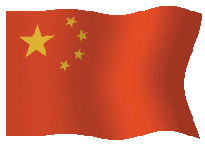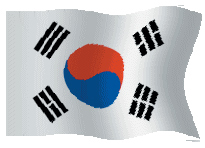
Rapid progress has been made in various fields on friendly relations and cooperation between the People’s Republic of China and the Republic of Korea since the two countries established diplomatic relations on 24 August 1992. In the political field, leaders of both sides have many exchanges of visits and meetings in multilateral activities on the international arena, which have promoted mutual understanding and trust and enhanced the development of bilateral relations. On the economic front, the mutually beneficial cooperation between the two countries has been constantly deepened and the two sides have become important trading partners. Progress has also been made in exchanges and cooperation in the fields of culture, education, science and technology. The two countries' cooperation and coordination in regional and international affairs have also been strengthened.
 
I. Political Relations and High-Level Exchanges
There have been smooth progress in political ties of the two countries since the establishment of diplomatic relations. Chinese leaders who have successively visited the ROK include President Jiang Zemin, Premier Li Peng, Qiao Shi, Chairman of the Standing Committee of the National People's Congress (NPC), Li Ruihuan, Chairman of the National Committee of the Chinese People's Political Consultative Conference(CPPCC), Vice-President Hu Jintao, Vice-Premier and Foreign Minister Qian Qichen. The ROK leaders who have visited China are Presidents (ROH Tae Woo, KIM Young Sam and KIM Dae Jung), Premier LEE Hong Goo, National Assembly Speakers (LEE Man Sup, HWANG Nak Joo, KIM Soo Han), Foreign Ministers (LEE Sang Ok, HAN Sung- joo, Ro-Myung GONG, YOO Chong Ha and PARK Chung Soo ). The incumbent Premier KIM Jung Pil has also visited China once in the capacity of Honorary Director-General of the United Liberal Democrats (ULD). The leaders of the two countries frequently hold meetings on the occasion of attending the international meetings. Chinese President Jiang Zemin met with Presidents KIM Young Sam and KIM Dae Jung on many occasions while attending the APEC informal summits. In April 1998, Chinese Premier Zhu Rongji met with President KIM Dae Jung when he attended the 2nd Asian-European Summit(ASEM) in London. In November 1999, Chinese Premier Zhu Rongji and the ROK President Kim Dae Jung had breakfast together during the informal summit of ASEAN, China, Japan and the ROK in Manila.
In November 1998, President KIM Dae Jung of the ROK paid a state visit to China. During the visit, he held talks with Chinese President Jiang Zemin and met with Li Peng, Chairman of the Standing Committee of the NPC, Premier Zhu Rongji, Vice-President Hu Jintao and Vice-Premier Qian Qichen. In the talks between heads of state of the two countries, Chinese President Jiang Zemin expressed his satisfaction with the development of the bilateral relations and his belief that the friendly relations and cooperation between the two countries would reach a new stage through the joint efforts of both sides. China and the ROK issued a Joint Communiquéexpressing their satisfaction with the remarkable progress achieved in the political, economic, social and cultural fields of the good-neighborly and friendly relations and cooperation during the past six years since the establishment of diplomatic relations, stating that all these were not only conducive to the developments of the two countries, but also to the stability and prosperity of this region as a whole. The two sides agreed that they will looksintosthe future and establish a Sino-ROK cooperation partnership oriented towards the 21st century based on the Principles enshrined in the UN Charter and the spirit of the Sino-ROK joint communique on the establishment of diplomatic relations as well as on the good-neighborly and friendly relations and cooperation since the establishment of diplomatic relations. During this visit, the two countries signed the treaty on the criminal and legal assistance, the agreement on the simplification of the visa granting procedure and on the granting of multiple entry-exit visa, the MOUs on the exchanges of visit between youths, the agreement on the exchanges and cooperation in the field of railways between China's Ministry of Railways and the ROK's Ministry of Construction and Transportation and the fisheries agreement was initialed. The heads from the ministries of foreign affairs, economic and trade cooperation, railways and construction of the two countries respectively had counterpart conversations in Beijing. President KIM Dae Jung visited Shanghai in addition to Beijing, followed by an official visit to the Hong Kong Special Administrative Region from 19 to 20 of November 1998 after he attended the APEC informal summit in the Philippines.
In October 2000, Premier Zhu Rongji paid an official visit to the Republic of Korea at the invitation of President Kim Dae Jung. During the visit, Premier Zhu held formal talks with President Kim Dae Jung and had a broad and in-depth exchange of views on issues of common concern such as the situation in the Korean Peninsular, bi-lateral ties etc. and reached many consensus. Both sides unanimously agreed to enhance Sino-ROK relations of cooperation and partnership to a new stage of all-round cooperation. Besides, Premier Zhu also met with speaker of the ROK National Assembly Lee Man Sup, Premier Lee Hanh Dong and major leaders of political parties. He had broad contacts and meetings with leaders of the four ROK economic organizations and other well-known economic personages and delivered a speech at the luncheon hosted by the four ROK economic organizations entitled“Sino-ROK Ties oriented towards all-round Cooperation”. The two countries signed a“Treaty on Extradition Between the People’s Republic of China and the Republic of Korea”.
II. Relations of Economic and Trade Cooperation
Since the establishment of diplomatic relations, the Governments of the two countries have successively signed a series of agreements including the agreement on trade cooperation, the agreements on investment protection, on the establishment of a joint committee on economic, trade and technological cooperation, on marine transportation, on avoiding double-taxation and preventing tax-evasion and on the peaceful use of nuclear powers. The bilateral economic and trade cooperation has achieved a steady, healthy and rapid development.
From 1992 to 1997, the bilateral trade volume has increased annually by a big margin, registering at US.036 billion in 1997. Affected by the Asian financial crisis, however, the Sino-ROK trade volume in 1998 decreased to .264 billion. In 1999, the bilateral trade volume rose to billion. According to Chinese statistics, Sino-ROK trade volume in 2000 was 34.5 billion U.S. dollars, an increase of 38% over the precious year, of which Chinese export was 11.2 billion U.S. dollars and import was 23.3 billion U.S. dollars. Up to the end of 2000, the Chinese side approved 15,395 items of investments by ROK enterprises with a contract value of 18.672 billion U.S. dollars and the actual amount spent was 10.245 billion U.S. dollars.
When the ROK was hit by the financial crisis, China provided it with 3 packages of financial aids totaling .5 million in the framework of the IMF working budget.
III. Scientific and Technological Cooperation and Exchanges in Culture and Other Areas
Friendly exchanges and cooperation have been carried out between the departments in charge of economic and trade cooperation, culture, science and technology, education, judiciary and local governments of China and the ROK. Chinese Consulate-General in Pusan and the ROK's Consulate-Generals in Shanghai and Qingdao were opened and the Consular Section of the ROK Embassy in China set up its branch office in Shenyang. The Sino-ROK friendship associations have been established in the two countries. By the end of 2000, there have been 56 pairs of sister cities, with a bilateral agreement of cultural cooperation reached and over 15,000 students from the ROK studying in China and 1615 Chinese students studying in the ROK. There are direct flights from China's cities of Beijing, Shanghai, Shenyang, Dalian, Qingdao to the ROK's Seoul or Pusan.
The military exchanges between China and the ROK are steadily growing. Military Attache's Offices have been set up in their respective Embassies. In August 1998, Lieutenant General Xiong Guangkai, Deputy-Chief of the General Staff of the Chinese People's Liberation Army led a delegation to visit the ROK. In August 1999, CHO Seong Tae, the ROK Minister of Defense visited China. In January 2000, Vice-chairman of the Central Military Commission and State Councillor and Defence Minister General Chi Haotian visited the ROK.
IV. Important Bilateral Agreements
1.The Trade Agreement Between the Governments of the People's Republic of China and the Republic of Korea(signed on September 30, 1992 and camesintosforce on October 30, 1992)
2.The Cultural Cooperation Agreement Between the Governments of the People's Republic of China and the Republic of Korea(signed on March 28, 1994 and camesintosforce on April 28, 1994)
Important Exchanges of Visits between Leaders of China and the Rok
Ⅰ.The ROK Leaders' visits to China
| Name |
Official post during the Visit |
Nature of the Visit |
Duration of the visit |
| LEE Sang Ock |
Foreign Minister |
Working Visit |
Aug.24,1992 |
| ROH Tae Woo |
President |
Official visit |
Sept.27-30,1992 |
| Han Sung-joo |
Foreign Minister |
Official visit |
Oct.27-31,1993 |
| LEE Man Sup |
Speaker of the National Assembly |
Official visit |
Jan.6-12.1994 |
| KIM Young Sam |
President |
Official visit |
March 26-30,1994 |
| HAN Sung-joo |
Foreign Mimister |
Official visit |
June 8-9,1994 |
| LEE Hong Goo |
Premier |
Official visit |
May 9-15,1995 |
| HWANG Nak-joo |
Speaker of the National Assembly |
Official visit |
Dec.20-26,1995 |
| Ro-Myung GONG |
Foreign Minister |
Official visit |
March 20-24,1996 |
| KIM Soo Han |
Speaker of the National Assembly |
Official visit |
Jan.28-Feb.1,1997 |
| YOO Chong Ha |
Foreign Minister |
Official visit |
May 18-20,1997 |
| PARK Chung Soo |
Foreign Minister |
Official visit |
July 11-14,1998 |
| KIM Dae Jung |
President |
State visit |
Dec.11-15,1998 |
Ⅱ.Chinese leaders' visits to the ROK
| Name |
Official Post during the visit |
Nature of the visit |
Duration of the visit |
| Qian Qichen |
Vice-Premier and Foreign Misister |
Official visit |
May 26-29,1993 |
| Li Lanqing |
Vice-premier |
Goodwill visit |
Sept.27-Oct.3.1993 |
| Li Peng |
Premier |
Official visit |
Oct.31-Nov.4,1994 |
| Qiao Shi |
Chairman of the Standing Committee of the National People's
Congress |
Official visit |
Apr.17-22.1995 |
| Jiang Zemin |
President |
State visit |
Dec.13-17,1995 |
| Wei Jianxing |
Chairman of the All-China Federation of Trade Unions |
Goodwill visit |
April 1996 |
| Hu Jintao |
Vice-President |
Official visit |
Apr.26-30,1998 |
| Li Ruihuan |
Chairman of the National Committee of the Chinese People's
Political Consultative |
Official visit |
May 9-15,1999 |
| Tang Jiaxuan |
Foreign Minister |
Official visit |
Dec.10-12,1999 |
| Zhu Rongji |
Premier |
Official visit |
Oct.17-22,2000 |
|
![]() 本网站由北京信息港提供网络支持
本网站由北京信息港提供网络支持


